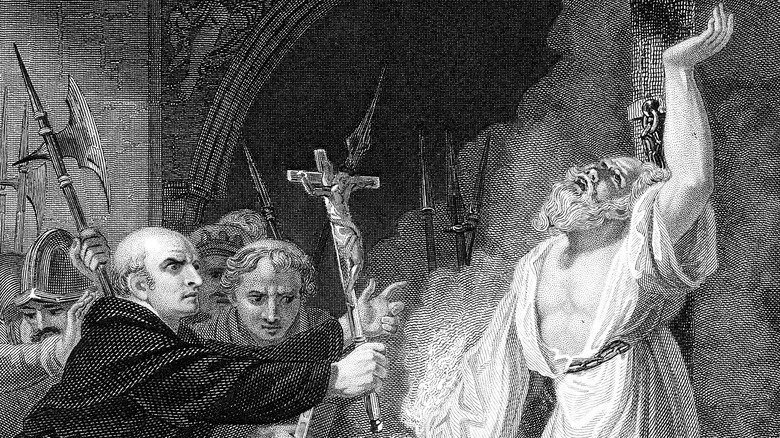The Dark Origins Of The Three Blind Mice Nursery Rhyme
Nursery rhymes taught to children are seemingly innocent. But when they are dissected line by line, a darker theme often emerges. In the case of the "Three Blind Mice," the lines of the rhyme are not quite suitable for kids — the mice get their tails cut off by a farmer's wife wielding a carving knife. It's quite a gruesome scene, but when combined with a jolly melody, it passes off as appropriate for children. Still, the "Three Blind Mice" isn't as simple as it seems. It's not merely about a farmer's wife getting rid of vermin; its origins are linked to Bloody Mary, the clash of two religions, and the execution of bishops (via Thrillist).
"Three Blind Mice" was first published in London on October 12, 1609. But it was not until 1842 that it became a popular nursery rhyme when it was included in "The Nursery Rhymes of England" compiled by J.O. Halliwell, according to Art Lark.
The three blind mice in history
According to Nursery Rhymes Collections, the "Three Blind Mice" is based on Mary I, also known as Bloody Mary, the daughter of Catherine of Aragon and King Henry VIII. Mary I became the Queen of England and was Catholic. During her reign, the Queen's belief in Catholicism fueled persecution against the Protestants. It is believed that the farmer's wife mentioned in the "Three Blind Mice" is a reference to Mary I.
Amid Mary I's reign, there were staunch Protestant believers who refused to renounce their faith — despite the consequences — and became known as the Oxford Martyrs. Three of them — Thomas Cranmer, Nicholas Radley, and Hugh Latimer — were Protestant bishops who stood by their beliefs and allegedly connived to dethrone Queen Mary I and bring back Protestantism as the main religion. Their efforts, however, were unsuccessful, and they were accused of heresy (via Mental Floss). The three bishops represent the three blind mice in the nursery rhyme who got their tails cut off for their blind beliefs. In reality, the bishops were not dismembered in any way — they were punished for their heresy by being burned at the stake.

